外研版选修7 Module 3 Literature Reading and vocabulary 课件(30张PPT)
文档属性
| 名称 | 外研版选修7 Module 3 Literature Reading and vocabulary 课件(30张PPT) |
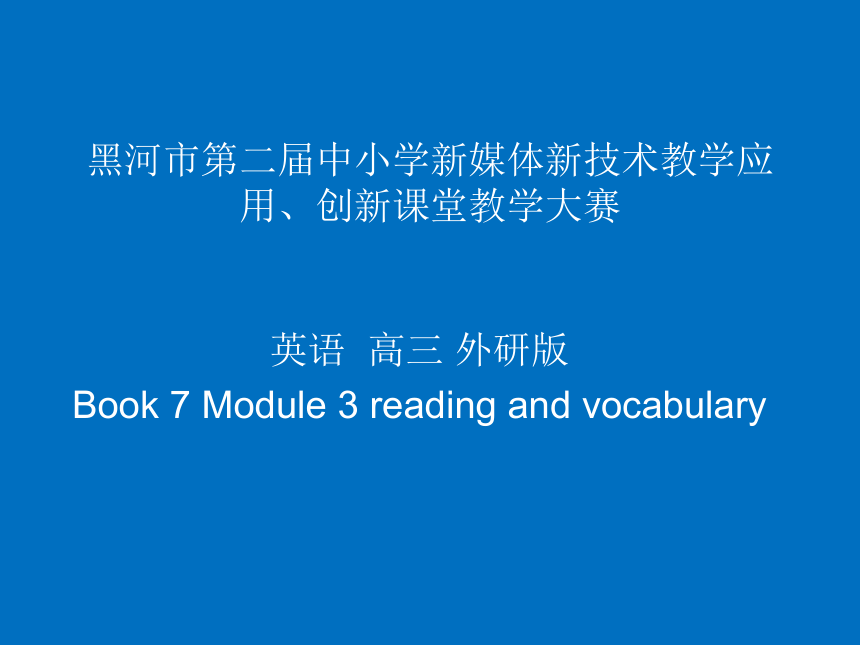
|
|
| 格式 | zip | ||
| 文件大小 | 2.0MB | ||
| 资源类型 | 教案 | ||
| 版本资源 | 外研版 | ||
| 科目 | 英语 | ||
| 更新时间 | 2020-05-21 00:00:00 | ||
图片预览

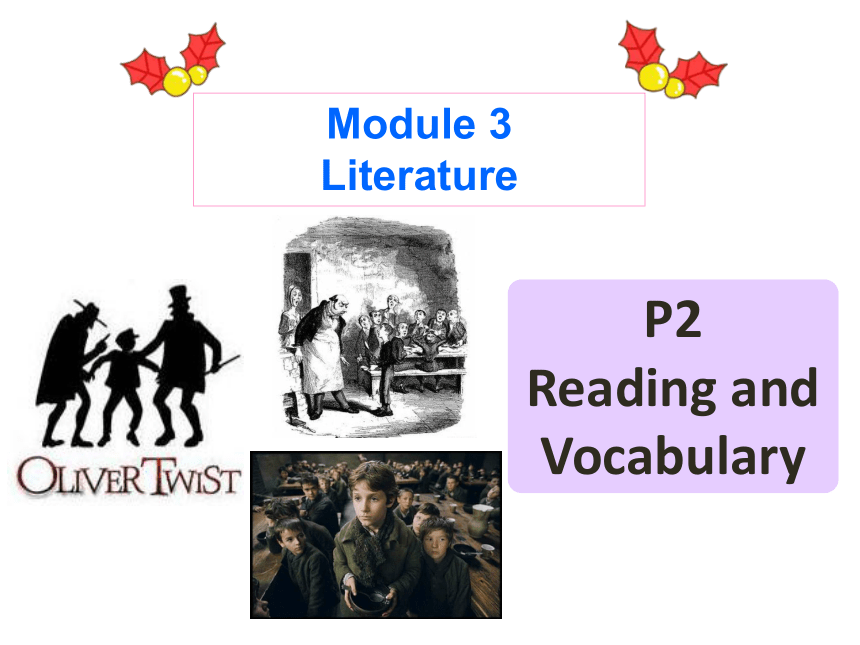
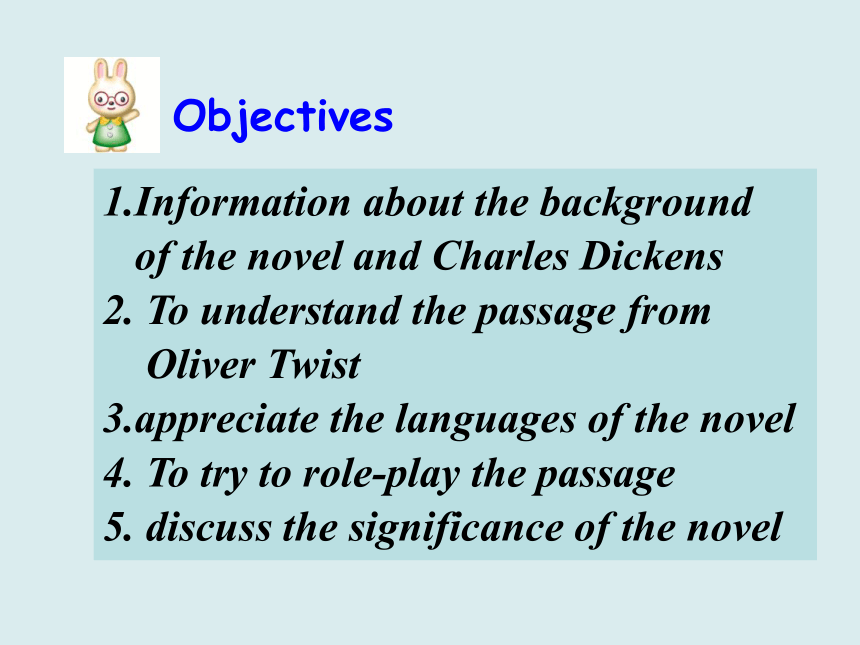
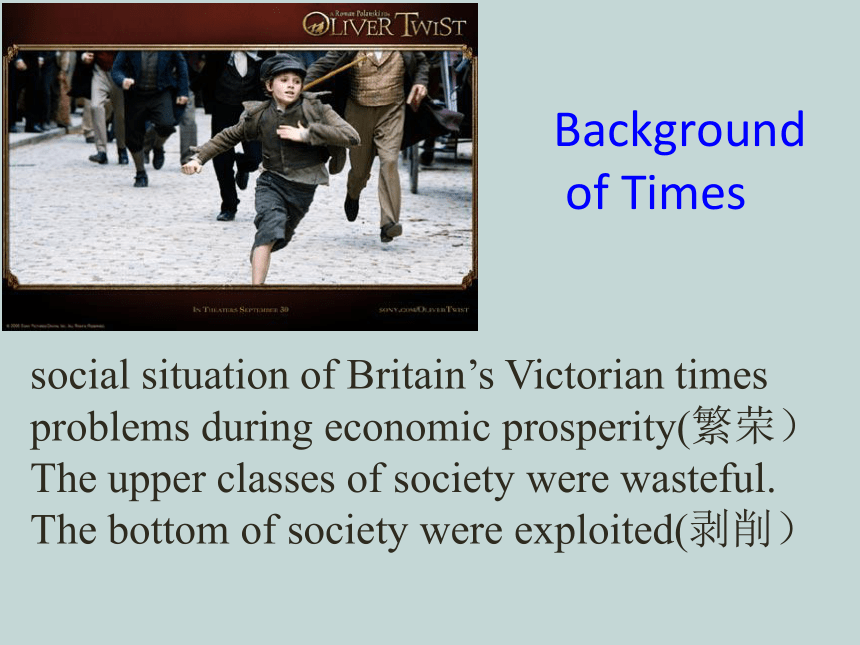
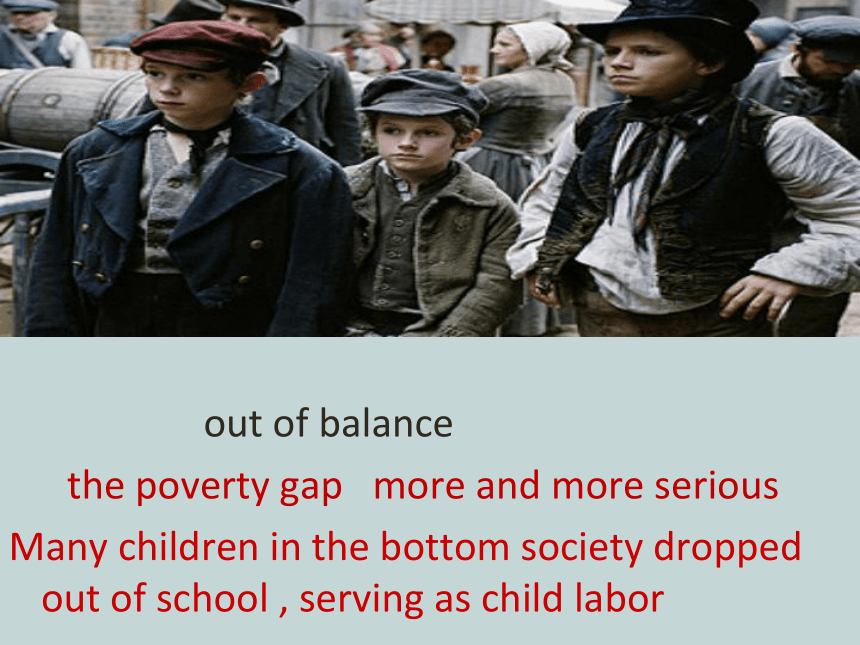
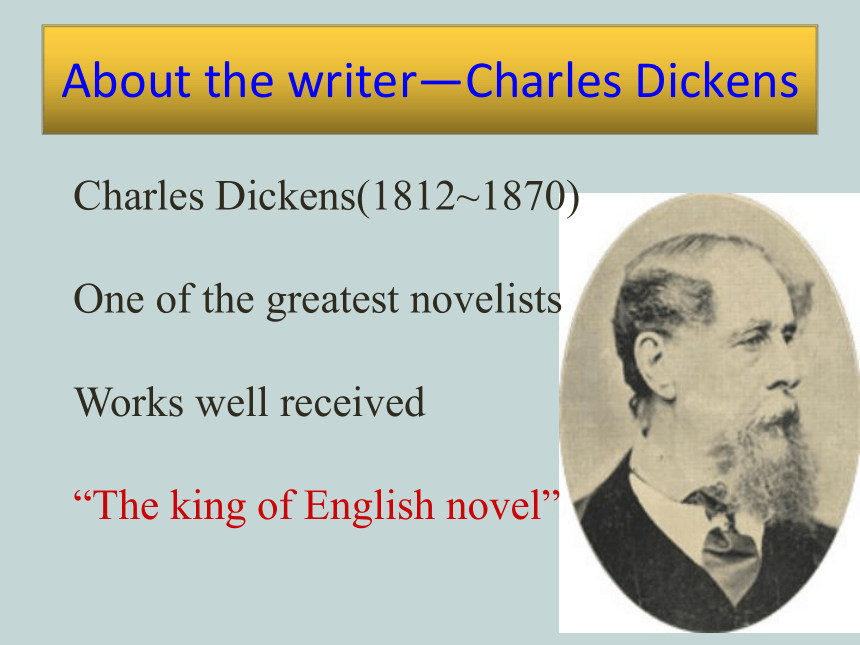
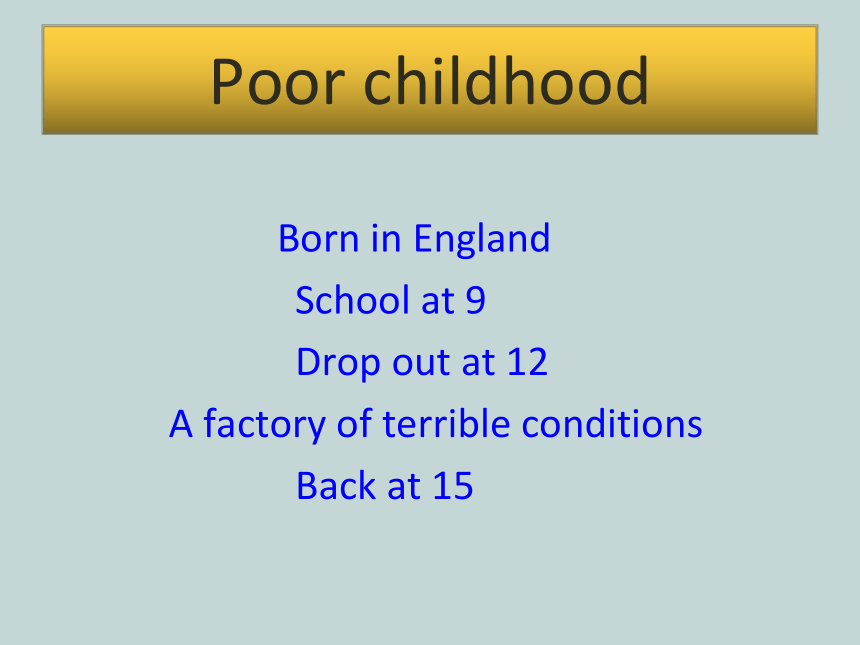
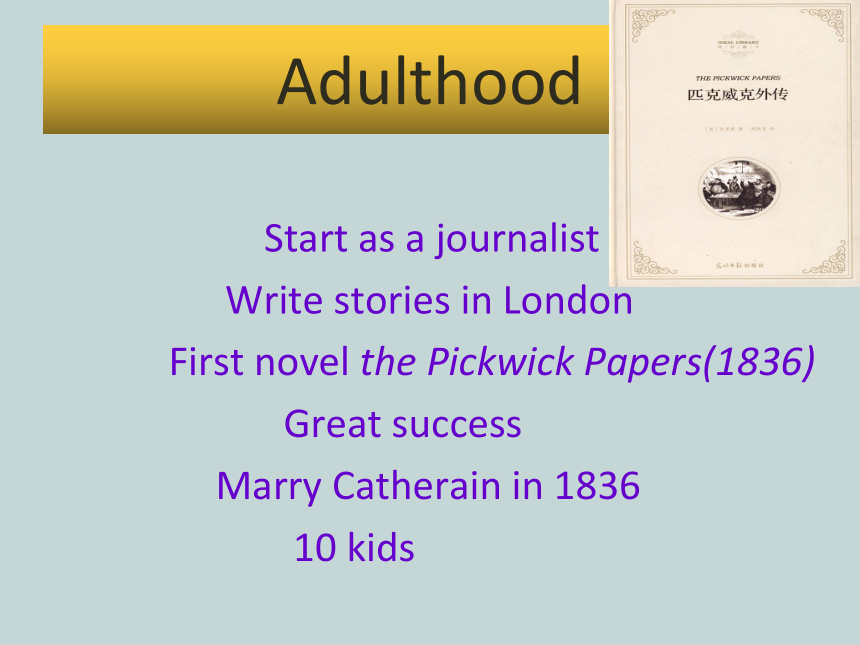
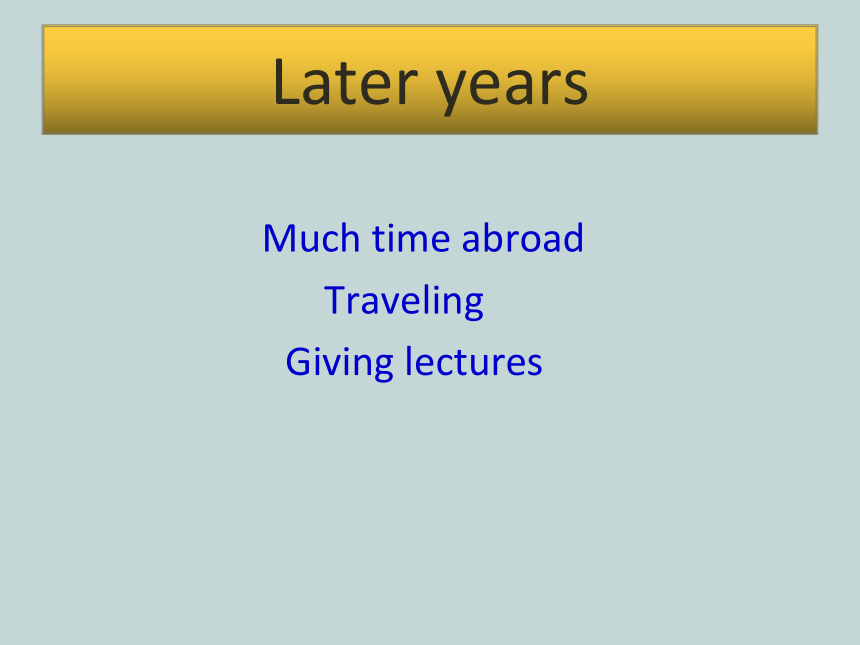
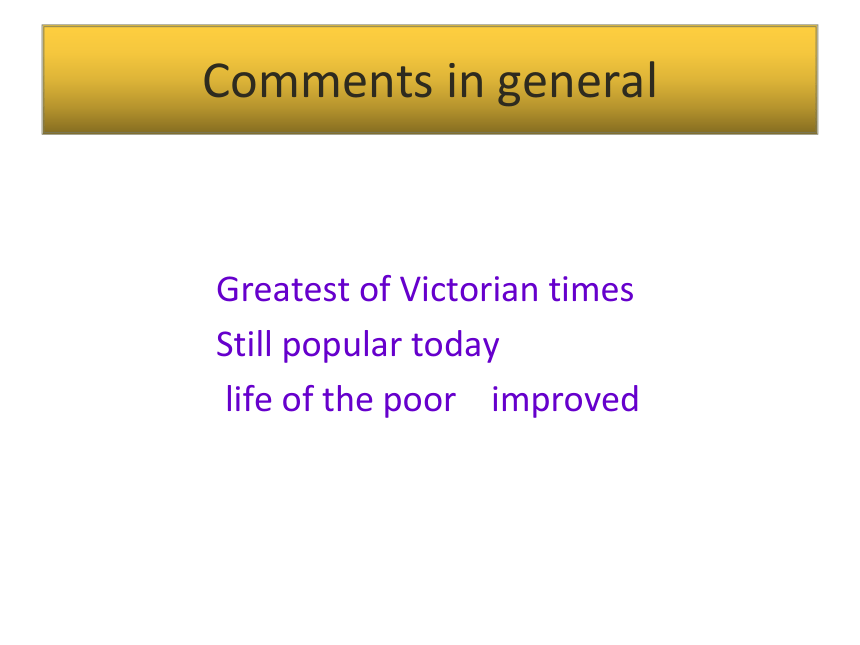

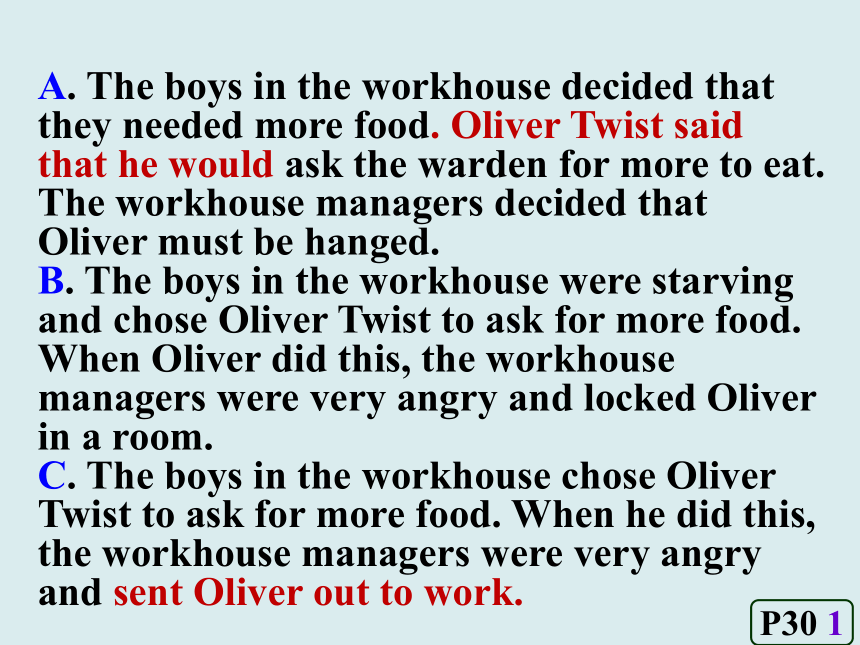
文档简介
(共30张PPT)
黑河市第二届中小学新媒体新技术教学应用、创新课堂教学大赛
英语 高三 外研版
Book 7 Module 3 reading and vocabulary
Module 3
Literature
P2
Reading and Vocabulary
Objectives
1.Information about the background of the novel and Charles Dickens
2. To understand the passage from
Oliver Twist
3.appreciate the languages of the novel
4. To try to role-play the passage
5. discuss the significance of the novel
Background
of Times
social situation of Britain’s Victorian times
problems during economic prosperity(繁荣)
The upper classes of society were wasteful.
The bottom of society were exploited(剥削)
out of balance
the poverty gap more and more serious
Many children in the bottom society dropped out of school , serving as child labor
About the writer—Charles Dickens
Charles Dickens(1812~1870)
One of the greatest novelists
Works well received
“The king of English novel”
Poor childhood
Born in England
School at 9
Drop out at 12
A factory of terrible conditions
Back at 15
Adulthood
Start as a journalist
Write stories in London
First novel the Pickwick Papers(1836)
Great success
Marry Catherain in 1836
10 kids
Later years
Much time abroad
Traveling
Giving lectures
Comments in general
Greatest of Victorian times
Still popular today
life of the poor improved
Choose the best summary.
A. The boys in the workhouse decided that they needed more food. Oliver Twist said that he would ask the warden for more to eat. The workhouse managers decided that Oliver must be hanged.
B. The boys in the workhouse were starving and chose Oliver Twist to ask for more food. When Oliver did this, the workhouse managers were very angry and locked Oliver in a room.
C. The boys in the workhouse chose Oliver Twist to ask for more food. When he did this, the workhouse managers were very angry and sent Oliver out to work.
P30 1
Some detailed information
Words:
serve desperate seize lock hang feed eager healthy support reward
Expressions:
in a … voice no sooner … than …
in astonishment put up
ask for pick out
1. Why did the bowls never need washing in the workhouse? 2.What did the other boys tell Oliver to do?
3. How did the warden feel when he heard Oliver’s words?
4. Why did Mr. Bumble rush into the meeting room?
5. What did the managers decide to do with Oliver?
Because the boys cleaned them with their spoons.
They decided to drive Oliver out of the workhouse.
To tell them the surprising news.
He was very surprised.
Ask for more food from the warden.
Read the passage and answer the following questions.
Major plot
Each boy was allowed ___________and no more.
They became quite _____________.
Oliver was chosen to _________________.
The warden as well as other managers in the workhouse were _________ and _________.
They decided to __________Oliver.
A notice was _______ , offering a ______ to anybody who would _______Oliver.
wild with hunger
ask for more food
astonished
angry
punish
put up
reward
employ
one bowl of soup
Appreciation and analysis of some language details
Showing the hunger of the boys
The bowls never needed washing…
They would sit staring at the pot with eager eyes ,as if they wanted to eat it
(the tall boy for his age)
…he might eat the small boy who slept next to him
…a wild ,hungry look in his eyes
Oliver , who was desperate with hunger and misery
The reaction of officials
The warden Mr. Bumble
Mr. Limbkins a gentleman in the white jacket
(the warden)
…his face became very pale…stared …held on to…thirty seconds…in a weak voice
(Mr. Bumble) …rushed into…in great excitement
Eveyone in the room…complete astonishment
Roles Play
Discussion
The Significance of the novel
It brought child poverty to the attention of public and for this reason it is a very important novel.
As a result of his work , the lives of the poor were improved.
to a certain degree ,Oliver twist was said to be responsible for the improvement of conditions in the English workhouse of the author’ day.
Homework
1,Find other similar books reflecting the society conditions of the time.
2,Preview reading and vocabulary(2)
Great expectations by Charles Dickens
Boys in the workhouse were always starving, for each one was allowed one bowl of soup. Three months later they became quite ______________. Finally they decided to _____ one ______ to ask for more food. _______ Oliver Twist _________ was chosen. In the evening, after Oliver ate his soup, he walked to the master and said, “Please sir, I want some more.” ________ had he spoken these words ________ the warden hit him on the head _____ the spoon. Then the managers of the workhouse had a meeting. Oliver was immediately _______ in a room. And the next morning a notice was _________ on the door, offering a ________ to anybody who would employ Oliver Twist.
wild with hunger
pick out
It was who
No sooner
than
locked
put up
reward
with
Fill in the blanks to finish the Summary of the text and then try to retell it.
注: word 文档
点击此处链接
1. The boys in the workhouse were given
one bowl of soup and another 60
grams of bread each day.
2. The tall boy was not used to being
hungry all the time.
3. No one believed that the tall boy could
eat that small boy.
4. If the boys hadn’t been very hungry,
they wouldn’t have chosen Oliver to
ask for more food.
Everyone
on special holidays.
Literature provides pleasure for listeners and readers.
Literature builds experience.?
Literature provides a language model for those who hear and read it.?
Literature helps you deal with your problems.
Literature improves reading ability and attitudes.?
1. English-Chinese
whisper desperate reward eager
in astonishment in a … voice
2. Chinese-English
抓住 端上(饭菜等) 刚一……就
喂养 用锁锁 张贴
When finishing, exchange your papers to see who does the best.
Now 2 minutes to test your spelling.
课时重点回顾
in astonishment
be wild with hunger
in a … voice
in great excitement
put up
no sooner … than …
惊讶地,吃惊地
由于饥饿而疯狂
用……声音(说);……声地
十分激动地
张贴
刚一……就
feed
pot
warden serve
eager
appetite
whisper
nudge
desperate
healthy
v. 喂养;为……提供食品
n. 锅
n. 管理员
v. 端上(饭菜等)
adj. 热切的;渴望的
n.胃口,食欲
v. 低声地说;耳语
v. 推开
adj. 绝望的
adj. 健康的
Read after the teacher and speak out the Chinese immediately.
in astonishment
support
in a … voice
no sooner … than …
seize
hang
lock
workhouse
reward
惊讶地,吃惊地
n. 支撑物
用……声音(说), ……声地
刚一……就
v. 抓住
v. 绞死;吊死
v. 用锁锁(起来)
n. (英国昔日的)济贫院;贫民习艺所
n. 酬谢;奖赏;赏金
黑河市第二届中小学新媒体新技术教学应用、创新课堂教学大赛
英语 高三 外研版
Book 7 Module 3 reading and vocabulary
Module 3
Literature
P2
Reading and Vocabulary
Objectives
1.Information about the background of the novel and Charles Dickens
2. To understand the passage from
Oliver Twist
3.appreciate the languages of the novel
4. To try to role-play the passage
5. discuss the significance of the novel
Background
of Times
social situation of Britain’s Victorian times
problems during economic prosperity(繁荣)
The upper classes of society were wasteful.
The bottom of society were exploited(剥削)
out of balance
the poverty gap more and more serious
Many children in the bottom society dropped out of school , serving as child labor
About the writer—Charles Dickens
Charles Dickens(1812~1870)
One of the greatest novelists
Works well received
“The king of English novel”
Poor childhood
Born in England
School at 9
Drop out at 12
A factory of terrible conditions
Back at 15
Adulthood
Start as a journalist
Write stories in London
First novel the Pickwick Papers(1836)
Great success
Marry Catherain in 1836
10 kids
Later years
Much time abroad
Traveling
Giving lectures
Comments in general
Greatest of Victorian times
Still popular today
life of the poor improved
Choose the best summary.
A. The boys in the workhouse decided that they needed more food. Oliver Twist said that he would ask the warden for more to eat. The workhouse managers decided that Oliver must be hanged.
B. The boys in the workhouse were starving and chose Oliver Twist to ask for more food. When Oliver did this, the workhouse managers were very angry and locked Oliver in a room.
C. The boys in the workhouse chose Oliver Twist to ask for more food. When he did this, the workhouse managers were very angry and sent Oliver out to work.
P30 1
Some detailed information
Words:
serve desperate seize lock hang feed eager healthy support reward
Expressions:
in a … voice no sooner … than …
in astonishment put up
ask for pick out
1. Why did the bowls never need washing in the workhouse? 2.What did the other boys tell Oliver to do?
3. How did the warden feel when he heard Oliver’s words?
4. Why did Mr. Bumble rush into the meeting room?
5. What did the managers decide to do with Oliver?
Because the boys cleaned them with their spoons.
They decided to drive Oliver out of the workhouse.
To tell them the surprising news.
He was very surprised.
Ask for more food from the warden.
Read the passage and answer the following questions.
Major plot
Each boy was allowed ___________and no more.
They became quite _____________.
Oliver was chosen to _________________.
The warden as well as other managers in the workhouse were _________ and _________.
They decided to __________Oliver.
A notice was _______ , offering a ______ to anybody who would _______Oliver.
wild with hunger
ask for more food
astonished
angry
punish
put up
reward
employ
one bowl of soup
Appreciation and analysis of some language details
Showing the hunger of the boys
The bowls never needed washing…
They would sit staring at the pot with eager eyes ,as if they wanted to eat it
(the tall boy for his age)
…he might eat the small boy who slept next to him
…a wild ,hungry look in his eyes
Oliver , who was desperate with hunger and misery
The reaction of officials
The warden Mr. Bumble
Mr. Limbkins a gentleman in the white jacket
(the warden)
…his face became very pale…stared …held on to…thirty seconds…in a weak voice
(Mr. Bumble) …rushed into…in great excitement
Eveyone in the room…complete astonishment
Roles Play
Discussion
The Significance of the novel
It brought child poverty to the attention of public and for this reason it is a very important novel.
As a result of his work , the lives of the poor were improved.
to a certain degree ,Oliver twist was said to be responsible for the improvement of conditions in the English workhouse of the author’ day.
Homework
1,Find other similar books reflecting the society conditions of the time.
2,Preview reading and vocabulary(2)
Great expectations by Charles Dickens
Boys in the workhouse were always starving, for each one was allowed one bowl of soup. Three months later they became quite ______________. Finally they decided to _____ one ______ to ask for more food. _______ Oliver Twist _________ was chosen. In the evening, after Oliver ate his soup, he walked to the master and said, “Please sir, I want some more.” ________ had he spoken these words ________ the warden hit him on the head _____ the spoon. Then the managers of the workhouse had a meeting. Oliver was immediately _______ in a room. And the next morning a notice was _________ on the door, offering a ________ to anybody who would employ Oliver Twist.
wild with hunger
pick out
It was who
No sooner
than
locked
put up
reward
with
Fill in the blanks to finish the Summary of the text and then try to retell it.
注: word 文档
点击此处链接
1. The boys in the workhouse were given
one bowl of soup and another 60
grams of bread each day.
2. The tall boy was not used to being
hungry all the time.
3. No one believed that the tall boy could
eat that small boy.
4. If the boys hadn’t been very hungry,
they wouldn’t have chosen Oliver to
ask for more food.
Everyone
on special holidays.
Literature provides pleasure for listeners and readers.
Literature builds experience.?
Literature provides a language model for those who hear and read it.?
Literature helps you deal with your problems.
Literature improves reading ability and attitudes.?
1. English-Chinese
whisper desperate reward eager
in astonishment in a … voice
2. Chinese-English
抓住 端上(饭菜等) 刚一……就
喂养 用锁锁 张贴
When finishing, exchange your papers to see who does the best.
Now 2 minutes to test your spelling.
课时重点回顾
in astonishment
be wild with hunger
in a … voice
in great excitement
put up
no sooner … than …
惊讶地,吃惊地
由于饥饿而疯狂
用……声音(说);……声地
十分激动地
张贴
刚一……就
feed
pot
warden serve
eager
appetite
whisper
nudge
desperate
healthy
v. 喂养;为……提供食品
n. 锅
n. 管理员
v. 端上(饭菜等)
adj. 热切的;渴望的
n.胃口,食欲
v. 低声地说;耳语
v. 推开
adj. 绝望的
adj. 健康的
Read after the teacher and speak out the Chinese immediately.
in astonishment
support
in a … voice
no sooner … than …
seize
hang
lock
workhouse
reward
惊讶地,吃惊地
n. 支撑物
用……声音(说), ……声地
刚一……就
v. 抓住
v. 绞死;吊死
v. 用锁锁(起来)
n. (英国昔日的)济贫院;贫民习艺所
n. 酬谢;奖赏;赏金
